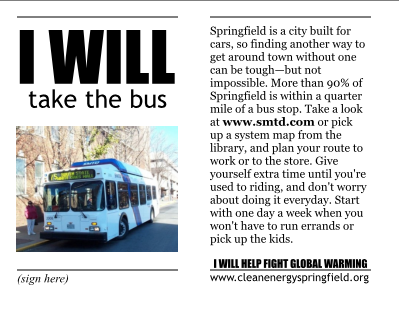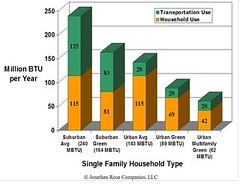Riding transit helps the environment more than a Prius

I will take the bus pledge from the Clean Energy Springfield (IL) blog.
When I used to work for the Center for Science in the Public Interest many many years ago, the standard line was "after smoking, the most significant health choice you can make is to eat less fat."
With the environment, the most significant choice you can make is not drive a car, especially on a trip alone (single occupancy vehicle). And that's true if you're driving a Prius or some other "environmentally friendly" car. A car is a car.

Energy use by household type.
Just like if you run, but still smoke, you miss the point, driving all the time, well, that's the most significant environmental behavior you can address.
Bill Bradley made some important points in the op-ed piece "We Can Get Out of These Ruts," in yesterday's Post. From the article:
President Bush correctly observed in 2006 that "America is addicted to oil." The United States is the world's most profligate consumer of oil, using 25 percent of the global supply. China, which has four times as many people, consumes 7 percent.
The largest tax that Americans have paid over the past five years has been assessed not by our government but by the Organization of Petroleum Exporting Countries. In 2001, OPEC's average price of crude oil was $23.12 per barrel. In 2005, it was $50.71, the equivalent of a tax increase of more than $55 billion. If you bought just 16 gallons of gas per week (a tankful) in 2005, you were paying $500 more per year for gasoline than you were in 2001. When you factor in the hundreds of billions paid for two wars in the Persian Gulf region in 15 years, a part of whose purpose related to oil, this addiction has cost taxpayers far more than costlier gasoline and heating oil. Yet our government has done almost nothing to deal with our dependence on oil, especially our dependence on insecure sources of foreign oil.
Somewhere I saw an article about choices you can make to reduce your energy impact. Using public transit has much greater impact than any of the choices they listed.
Also see this New Yorker article, "Green Manhattan," about how NYC uses energy more efficiently than the suburbs.
Of course, there is the food-agriculture issue.
Labels: energy, environment, food-agriculture-markets



0 Comments:
Post a Comment
<< Home